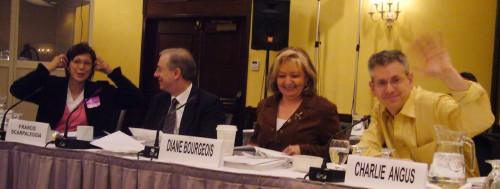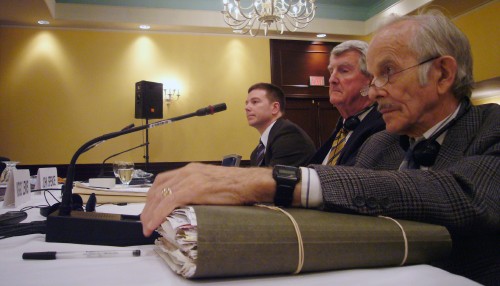Yesterday a dream came true. I associated the phrase “rat bastards” with the CBC in the permanent record of a committee of the House of Commons.
For the third time (after 1990 and 2002), I gave “evidence” before the Standing Committe on Canadian Heritage. It’s always about accessibility one way or another. This time it was about captioning on CBC. My written brief discussed other topics, but in my ten-minute speaking slot, I had to prioritize. (I ran about 9:30. I pride myself on always being the best-prepared person on a panel. I handed the interpreters two sets of terminology lists [lexicons, essentially] well beforehand, earning a commendation from the head interpretrix.)
The committee is investigating the role («rôle,» shurely?!) of the CBC in the 21st century. Usually they only hold hearings in Ottawa (to which they paid my expenses the last time and didn’t the first time), but on this round they dragged a dozen staff and a ton of A/V equipment to Toronto for a roadshow. Of course I took pictures.

CHARLIE ANGUS: Is this going on a blog site?
Unless there’s a large posse from a single organization giving “evidence,” they do what photographers do when scanning old slides – they gang unrelated witnesses together. And yesterday, I found myself intermingled amid the kooks. I kid, I kid!

Or actually, maybe I don’t. I had a reasonable veteran broadcasting executive to my left advocating that all government broadcast funding go to the CBC (a fair proposal that would overturn many an apple cart). And to my right were two old guys complaining about CBC’s leftist bias and, at the end of the table, the shadowy editor of CBC Watch, John Spence.
I gave my presentation, with no problems at all. The last third was a flat-out pitch for the Open & Closed Project. I received a scant few questions.
- One asked what my top two preferred remedies were. (100% captioning plus audio description on many programs; all accessibility carried out according to independently-developed standards. I should have also insisted that CBC publish its current captioning “standards,” but I had mentioned that already.)
- And another question – to the whole table, really – concerned what happens when you file any kind of complaint with the CBC. I replied that my sorts of complaints weren’t in the same category as theirs, but really, CBC has only two modes of response, as flinchers and as rat bastards (which drew a little cheer from Tina Keeper). We have to get them out of those two ruts, I said. (And when you read the transcript, you’ll love the example I gave for flinch mode.)
Charlie Angus stated that captioning is always on at his house, as his daughter is deaf. He finds a lot of Canadian DVDs with no captioning, and, after taking a moment to vent about captioning errors and delays, asked what I knew about CBC DVDs. I backed him up and found out he was talking about real-time captioning (whose errors and delays I explained), and stated that the CBC DVDs I’ve watched have all had captioning, some also with description. I missed a chance to reiterate my point that CBC overuses real-time captioning, though that too I had already stated.
Tina Keeper came up to me afterward and, in a pleasant and chummy manner, asked for more information so she could pass it along to her aboriginal friends back in Manitoba. (I gave her the blue card. I proudly stated that all my sites will work fine on her BlackBerry.) She’s got a theory why disability is more prevalent among aboriginals (apart from diet) – that they don’t get as much exercise as they did when they were out on the land, and they just might not be cut out to be couch potatoes.
And that was my Friday afternoon.
As we were leaving, Spence was talking on his shoephone in a dark corner. “Joe! Joe!” he called out. “John! John!” I answered. He put out the hand that wasn’t holding the phone, smiled, and muttered some kind of thanks. I gave him a firm handshake and told him the sort of thing right-wing guys need to hear more often: “I didn’t expect you to be so cute.”
Eat your heart out, Peggy Zulauf.